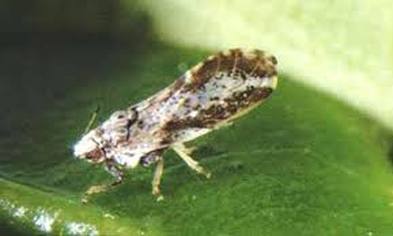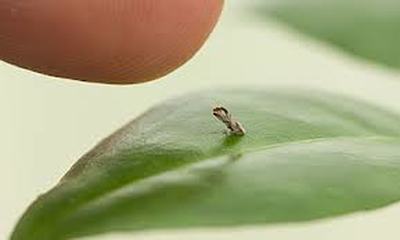 Asian Citrus Pyllid
Asian Citrus Pyllid
As citrus greening disease sweeps through the US citrus industry, many of us waited with dread since we all knew it was just a matter of time before it got to Texas. So we weren’t too surprised when we got word that--sure enough—it had been observed in the valley. Spread by the Asian citrus psyllid, this lethal and incurable disease known as huangglongbing (yellow dragon disease in Chinese) or citrus greening could easily wipe out citrus in this country. This is not an exaggeration. So far, nothing has even slowed it down.
So cheer this announcement this week published on Science Daily: “In 2011, for the first time entomologists at the University of California, Riverside released Tamarixia radiata, a wasp that is the natural enemy of ACP (Asian citrus psyllid), in an orange grove in Riverside to help control the psyllid. But is this wasp safe to use? Does its introduction pose any risk to the environment?
“Results from Federally mandated tests performed at the University of California, Riverside now show that Tamarixia radiata is indeed safe for the environment and poses no undue risk to other insects, humans, or pets. 'Our work demonstrates that Tamarixia radiata is very specific to the target it is being released to kill—the nymphs of the Asian citrus psyllid in this case,’ said Mark Hoddle, the director of the Center for Invasive Species Research, whose lab performed the tests.’”
The article also reported that the study included offering the Tamarixia radiata a choice of psyllids native to California and the Asian citrus psyllid. With one exception, the Tamarixia radiata targeted only the Asian citrus psyllid. The exception was the pest potato psyllid, which carries a bacterium, causing zebra chip disease, and even then, the predation rate was only 5%. The report commented that the study was important because Tamarixia radiata is already being used to control the Asian citrus psyllid in Florida, Texas, the Caribbean, Central and South America and Mexico.
So cheer this announcement this week published on Science Daily: “In 2011, for the first time entomologists at the University of California, Riverside released Tamarixia radiata, a wasp that is the natural enemy of ACP (Asian citrus psyllid), in an orange grove in Riverside to help control the psyllid. But is this wasp safe to use? Does its introduction pose any risk to the environment?
“Results from Federally mandated tests performed at the University of California, Riverside now show that Tamarixia radiata is indeed safe for the environment and poses no undue risk to other insects, humans, or pets. 'Our work demonstrates that Tamarixia radiata is very specific to the target it is being released to kill—the nymphs of the Asian citrus psyllid in this case,’ said Mark Hoddle, the director of the Center for Invasive Species Research, whose lab performed the tests.’”
The article also reported that the study included offering the Tamarixia radiata a choice of psyllids native to California and the Asian citrus psyllid. With one exception, the Tamarixia radiata targeted only the Asian citrus psyllid. The exception was the pest potato psyllid, which carries a bacterium, causing zebra chip disease, and even then, the predation rate was only 5%. The report commented that the study was important because Tamarixia radiata is already being used to control the Asian citrus psyllid in Florida, Texas, the Caribbean, Central and South America and Mexico.
